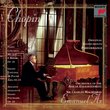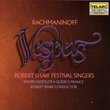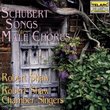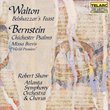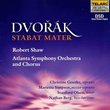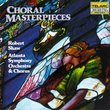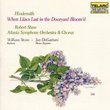| All Artists: Johann Sebastian Bach, Atlanta Symphony Orchestra & Chorus, Robert Shaw, Sylvia Mcnair, Delores Ziegler, Marietta Simpson, John Aler, William Simpson, Thomas Paul Title: Bach: Mass in B minor / McNair, Ziegler, Simpson, Aler, Stone, Paul; Shaw Members Wishing: 0 Total Copies: 0 Label: Telarc Release Date: 10/10/1990 Genre: Classical Styles: Opera & Classical Vocal, Historical Periods, Baroque (c.1600-1750), Modern, 20th, & 21st Century Number of Discs: 2 SwapaCD Credits: 2 UPC: 089408023323 |
Search - Johann Sebastian Bach, Atlanta Symphony Orchestra & Chorus, Robert Shaw :: Bach: Mass in B minor / McNair, Ziegler, Simpson, Aler, Stone, Paul; Shaw
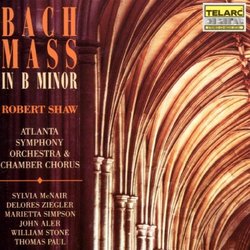 | Johann Sebastian Bach, Atlanta Symphony Orchestra & Chorus, Robert Shaw Bach: Mass in B minor / McNair, Ziegler, Simpson, Aler, Stone, Paul; Shaw Genre: Classical
Robert Shaw's reading of the B Minor Mass is, in one sense at least, just what one would expect: sober and purposeful, beautifully shaped (Shaw is a master architect), it centers on the chorus. Like all of Shaw's choruses,... more » |
Larger Image |
CD DetailsSynopsis
Amazon.com Robert Shaw's reading of the B Minor Mass is, in one sense at least, just what one would expect: sober and purposeful, beautifully shaped (Shaw is a master architect), it centers on the chorus. Like all of Shaw's choruses, the Atlanta group has that trademark richness of body and blend, and it sings with utter unanimity as though it were one great voice. Shaw opts for marginally broader tempos than those found in most period-instrument performances but is nowhere near as glacial as some interpreters. Yet oddly enough, the approach seems more idealized, and less passionate and expressive, than one might expect from a conductor famous for giving his singers adrenaline rushes. Proof again that one should expect the unexpected from Shaw, as well as the expected. It's part of his fascination. --Ted Libbey Similarly Requested CDs
|
CD ReviewsEven 200 stars would not be enough Bob Zeidler | Charlton, MA United States | 10/22/2000 (5 out of 5 stars) "Two hundred is probably a conservative lower bound on the likely number of times that Robert Shaw performed this monumental work over his considerable artistic lifetime. In the process, which covers a career that began with his Collegiate Chorale in 1941, then the Robert Shaw Chorale in 1948, then his tenure at the Cleveland Orchestra, as chorus director and assistant conductor under George Szell, then his appointment as music director of the Atlanta Symphony Orchestra in 1968, and ultimately his frequent choral workshops in New York resulting in Carnegie Hall performances, this was one of his most frequently performed works. On various tours with these musical organizations, Shaw carried this masterpiece throughout the country and around the world. In his authorized biography, "Dear People," written by Joseph Musselman (a former Shaw chorister who later achieved his own musical reknown as a choral music practitioner), there is a wealth of anecdotes about how his performances of this work could reduce folks to tears, from Alaskan Aleuts to college kids everywhere to Soviet apparatchiks at the height of the Cold War. One of the most telling anecdotes regarding his mastery, as well as his unassuming modesty in the face of it all, occurred after a performance that must have really jelled. Following the concluding "Dona Nobis Pacem" of the Bm Mass, Shaw left the podium and darted behind the curtain, awaiting the applause. He waited, and waited some more. Finally, not understanding why it was that the applause never arrived, he poked his head out from behind the curtain, only to find both the audience and the musicians facing each other and bawling their eyes out from what must have been a rendering of "Dona Nobis Pacem" for all time, in terms of its ability to open these tear-duct floodgates. I read that anecdote in "Dear People" and listen to this recording for posterity and can only conclude that no one could top Shaw in this work, which, over a period of many years, I've finally come around to conclude in my own mind, is what may well be the finest contribution to what we call civilization. I have three other highly-regarded recordings of the Bm Mass, by Karl Richter, John Eliot Gardner, and Ifor Jones leading the Bethlehem Bach Choir, the only group who is remotely close to Shaw in terms of performance realizations. Each of them is fine in its way, and in its performance practices (whether "authentic instruments" or "modern," or "massive" choral resources vs. "reduced" forces). Each communicates the importance of the work, and I do not consider them useless duplication for a work this significant. But when I want to be moved by the work, to truly be reduced to a quivering mass of jelly, this Shaw recording is always the one I turn to. His "Dona Nobis Pacem" grants me a serenity and quality of peace that no other performance can match. Bob Zeidler" Perfection madamemusico | 02/18/2000 (5 out of 5 stars) "The orchestra playing is pretty good. It's on modern instruments, and thus it's very expansive and perhaps even heavy. Shaw's tempi are also slower, even downright legubrious at times, but I prefer to hear them as "serene," which suits the work. The soloists are ne plus ultra. Sylvia McNair is utterly moving here. She is astounding in the Christe, the Domine deus, and the duet with alto in the Et in Unum Dominum. Simpson is also very full and very musical. Stone & Paul are also quite good. Sylvia McNair, though, ah! An angel. The recording is almost worth buying just for her performance." Indescribably Beautiful and Ingenious Bob Zeidler | 04/27/2002 (5 out of 5 stars) "This remains the best recording of the B minor mass that I have ever heard. Each and every phrase soars to new levels. This recording, and of course, this mass, uplift the listener spiritually and intellectually. I own two other recordings of this mass, another by Robert Shaw with his own chorale and another with Herbert von Karajan. This second Robert Shaw recording, although wonderful, remains inferior to this Atlanta recording. I especially love the Credo, which very accurately portrays the trinity in its canonical form along with the unity of the father and the son with the "Et in unum Dominum, Jesum Christum." No recording more convincingly captures the reader's emotions and intellect in a spiritual ecstasy than this Robert Shaw Recording. Enjoy!"
|

 Track Listings (2) - Disc #1
Track Listings (2) - Disc #1